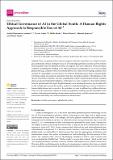Por favor, use este identificador para citar o enlazar a este item:
http://hdl.handle.net/10261/305941COMPARTIR / EXPORTAR:
 SHARE SHARE
 CORE
BASE CORE
BASE
|
|
| Visualizar otros formatos: MARC | Dublin Core | RDF | ORE | MODS | METS | DIDL | DATACITE | |

| Campo DC | Valor | Lengua/Idioma |
|---|---|---|
| dc.contributor.author | Monasterio Astobiza, Aníbal | es_ES |
| dc.contributor.author | Ausín, Txetxu | es_ES |
| dc.contributor.author | Liedo Fernández, Belén | es_ES |
| dc.contributor.author | Toboso-Martín, Mario | es_ES |
| dc.contributor.author | Aparicio, Manuel | es_ES |
| dc.contributor.author | López Castro, Daniel | es_ES |
| dc.date.accessioned | 2023-04-12T08:05:40Z | - |
| dc.date.available | 2023-04-12T08:05:40Z | - |
| dc.date.issued | 2022 | - |
| dc.identifier.citation | Proceedings 81 (1): 136 (2022) | es_ES |
| dc.identifier.uri | http://hdl.handle.net/10261/305941 | - |
| dc.description | Este artículo está sujeto a una licencia CC BY 4.0 | es_ES |
| dc.description.abstract | There is a growing debate on how to regulate and make responsible use of digital technologies, particularly artificial intelligence (AI). In an increasingly globalized scenario, power relations and inequalities between different countries and regions need to be addressed. While developed countries are leading the building of an ethical governance architecture for AI, in the so-called global south (e.g., countries with a post-colonial history, also called non-developing countries), their situation of vulnerability and dependence on northern domination leads them to import digital technology, capital and modes of organization from these developed countries. This imbalance, in the absence of an ethical reflection, can have a significantly negative impact on their already excluded, oppressed and discriminated populations. In this paper, we want to explore to what extent countries from the global south that import digital technology from developed countries may be affected if we do not take into account the need for multi-level and ethical global governance of AI from a human rights/democratic perspective. In particular, we want to address two problems that may arise: (a) Lack of governance capacity in southern populations resulting from their dependence from northern leadership on technological innovations and regulations, and (b) material and workforce extractivism inflicted by the northern countries on southern ones. | es_ES |
| dc.description.sponsorship | The authors gratefully acknowledge the support by the project EXTEND: Bidirectional Hyper- Connected Neural System” (H2020 Research Project, ref. 779982), EthAI+3 (PID2019-104943RB-100) and INEDyTO II-Bioética y Final de la Vida-PID2020-118729RB-I00. Belén Liedo thanks the Spanish Ministry of Universities grant FPU19/06027. | es_ES |
| dc.language.iso | eng | es_ES |
| dc.publisher | Multidisciplinary Digital Publishing Institute | es_ES |
| dc.relation | info:eu-repo/grantAgreement/EC/H2020/779982 | es_ES |
| dc.relation | info:eu-repo/grantAgreement/AEI/Plan Estatal de Investigación Científica y Técnica y de Innovación 2017-2020/PID2019-104943RB-I00/ES/ETICA DIGITAL. LA MEJORA MORAL DESDE UN USO INTERACTIVO DE LA INTELIGENCIA ARTIFICIAL/ | es_ES |
| dc.relation | info:eu-repo/grantAgreement/AEI/Plan Estatal de Investigación Científica y Técnica y de Innovación 2017-2020/PID2020-118729RB-I00/ES/BIOETICA Y PRACTICAS RELACIONADAS CON EL FINAL DE LA VIDA/ | es_ES |
| dc.relation.isversionof | Publisher's version | es_ES |
| dc.rights | openAccess | es_ES |
| dc.subject | AI | es_ES |
| dc.subject | Ethics | es_ES |
| dc.subject | Governance | es_ES |
| dc.subject | Global south | es_ES |
| dc.subject | Policy | es_ES |
| dc.title | Ethical Governance of AI in the Global South: A Human Rights Approach to Responsible Use of AI | es_ES |
| dc.type | artículo | es_ES |
| dc.identifier.doi | 10.3390/proceedings2022081136 | - |
| dc.description.peerreviewed | Peer reviewed | es_ES |
| dc.relation.publisherversion | https://doi.org/10.3390/proceedings2022081136 | es_ES |
| dc.identifier.e-issn | 2504-3900 | - |
| dc.rights.license | https://creativecommons.org/licenses/by/4.0/ | es_ES |
| dc.contributor.funder | European Commission | es_ES |
| dc.contributor.funder | Ministerio de Universidades (España) | es_ES |
| dc.relation.csic | Sí | es_ES |
| oprm.item.hasRevision | no ko 0 false | * |
| dc.identifier.funder | http://dx.doi.org/10.13039/501100000780 | es_ES |
| dc.contributor.orcid | Monasterio Astobiza, Aníbal [0000-0003-1399-5388] | es_ES |
| dc.contributor.orcid | Ausín, Txetxu [0000-0003-2098-5540] | es_ES |
| dc.contributor.orcid | Liedo Fernández, Belén [0000-0002-8109-8454] | es_ES |
| dc.contributor.orcid | Toboso-Martín, Mario [0000-0001-9284-3643] | es_ES |
| dc.contributor.orcid | López Castro, Daniel [0000-0003-2652-5959] | es_ES |
| dc.type.coar | http://purl.org/coar/resource_type/c_6501 | es_ES |
| item.openairetype | artículo | - |
| item.languageiso639-1 | en | - |
| item.fulltext | With Fulltext | - |
| item.grantfulltext | open | - |
| item.cerifentitytype | Publications | - |
| item.openairecristype | http://purl.org/coar/resource_type/c_18cf | - |
| Aparece en las colecciones: | (CCHS-IFS) Artículos | |
Ficheros en este ítem:
| Fichero | Descripción | Tamaño | Formato | |
|---|---|---|---|---|
| Ethical_governance.pdf | 230,38 kB | Adobe PDF |  Visualizar/Abrir |
CORE Recommender
Page view(s)
37
checked on 11-may-2024
Download(s)
69
checked on 11-may-2024
Google ScholarTM
Check
Altmetric
Altmetric
Este item está licenciado bajo una Licencia Creative Commons

